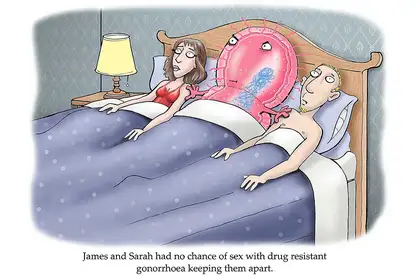
Credit: Dr Nick Kim from the School of Public Health.
The threat of increased antibiotic resistance is often in the headlines. Now two Massey University researchers argue that in the case of sexually-transmitted gonorrhoea, this is inevitable, and we had better figure out what to do after the antibiotics stop working.
Dr Collette Bromhead and Dr Heather Hendrickson co-authored an article entitled ‘Untreatable gonorrhea, are we there yet?’ published this week in The Biochemist, looking at how we got to this point, and what the future might hold.
Gonorrhoea is a common and easily spread bacterial disease that has modified its genetics over time. And in most countries, including New Zealand, there is only one remaining antibiotic with which to treat it.

Dr Collette Bromhead.
Dr Bromhead, senior lecturer in molecular microbiology from the College of Health, says gonorrhoea has evolved swiftly and mercilessly to resist every single class of antibiotics introduced since the mid-1930s. “Currently, in most countries, the only options for first-line treatment are injectable antibiotics. However, in 2012, we found the first scary genetic signatures of resistance to these drugs circulating in New Zealanders. We are only a hair’s breadth away from being unable to treat gonorrhoea with antibiotics at all.”
That is a scary thought, with about one in 10 infected men and almost half of infected women not experiencing any symptoms, allowing the nasty infection to spread more easily.
“To make things worse, many pharmaceutical companies have lost interest in pursuing the expensive research and development needed to develop novel antibiotics because rapid resistance leads to a failure to recuperate their investments. Without new treatment options, we face a return to the pre-antibiotic era, and the days of devastating childhood mortality, amputation and infections that can kill millions of people,” Dr Bromhead says.
So how can science help? Bacteriophages (phages for short) are used today in Russia, Georgia and Poland to fight bacterial infections. They are protein-based entities that attach themselves to bacterial cells, infecting them. Phages only target the bacteria they are meant to kill, eliminating any disruption of the greater microbiome that can occur with some antibiotics.

Dr Heather Hendrickson.
Dr Heather Hendrickson from Massey’s Institute of Natural and Mathematical Sciences says our top priority is to preserve the antibiotics we have left through embracing the principles of antibiotic stewardship.
“In other words, we must stop abusing antibiotics for things like viral infections. On a personal level, get yourself and your children immunised with every single vaccine your healthcare provider recommends, even if you have to pay for it. And keep an eye out for the release of new vaccines.
“The public genuinely needs to figure out what is more frightening when it comes to protecting the young and vulnerable: sex or untreatable infections? Antibiotic resistance is a problem for everyone, not just doctors, scientists and pharmaceutical companies. Health protection agencies must move from being reactive to proactive. We need to find new ways of incorporating phage and phage products into medicine. If we don’t win this fight, the bugs will carry on here long after we have disappeared,” Dr Hendrickson says.